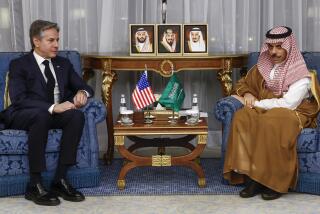U.S. Envoy Will Seek to Mend Arab Ties
- Share via
WASHINGTON — The Reagan Administration’s chief Mideast trouble-shooter, Richard W. Murphy, will visit Egypt and Jordan early next month to try to repair U.S. relations with the Arab world, which have been severely damaged by secret U.S. arms sales to Iran, it was announced Tuesday.
Murphy, assistant secretary of state for Near Eastern and South Asian affairs, also will stop in Israel on his first trip to the region since September, State Department spokeswoman Phyllis Oakley said.
Oakley said Murphy will assess the current status of Middle Eastern peace efforts. However, she conceded that he will not carry a new U.S. initiative to restart the process, which has been stalled for most of this year.
Shaken by Arms Deal
This country’s status as a peace broker between Israel and its Arab neighbors was shaken by disclosures that the United States, aided by Israel, sold weapons to non-Arab Iran for use in its war against Arab Iraq.
Although Oakley did not mention the Iran scandal, other officials said Murphy’s main focus will be on repairing relations with the Arabs.
State Department officials have said privately that there is virtually no hope for progress in the peace process until the Iranian controversy dies down.
Clovis Maksoud, the Arab League’s representative in the United States, told a Washington news conference Tuesday that he hopes the Murphy trip will signal a new U.S. policy in the Middle East more sympathetic to the Arab cause.
Maksoud said the arms sale scandal was a “blessing in disguise” because it disclosed what he described as Israel’s “free-wheeling” influence in Washington.
Weakening Israel’s Friends
He said the controversy might strengthen Administration officials who are favorable to the Arabs and weaken Israel’s friends in the U.S. government.
The last U.S.-mediated effort to reopen Arab-Israeli negotiations collapsed in February, when King Hussein and Palestine Liberation Organization leader Yasser Arafat abandoned plans for a Jordanian-Palestinian delegation that could hold talks with U.S. representatives in preparation for possible discussions with Israel.
Hussein has said he is unwilling to negotiate with Israel without PLO support. Israel wants to hold bilateral talks with Jordan but is unwilling to include the PLO, which it regards as a terrorist organization bent on destroying Israel.
The United States will continue to pursue the peace process, Oakley said, “although a formula for negotiations has not yet been found.”
Visit to Poland
In another New Year’s diplomatic development, Deputy Secretary of State John C. Whitehead is expected to visit Poland next month, becoming the highest ranking U.S. official to meet Polish officials since martial law was imposed five years ago.
The warming trend in Washington-Warsaw relations began last month when Rozanne L. Ridgway, assistant secretary of state for Europe, visited Poland.
Oakley said the exact itinerary of Whitehead’s trip to Eastern Europe is not yet firm but that a visit to Warsaw is being considered.
“We are continuing to encourage the Polish government to use the September amnesty of political prisoners as a basis for improving political dialogue with important elements of Polish society,” Oakley said. “We will continue to gauge further improvement in our relations in light of the Polish government’s maintaining its amnesty and moving toward genuine national reconciliation.
“Our policy toward Poland remains under review,” she added. “As one element of that policy, we will respond in a timely and deliberate fashion to steps taken by the Polish government.
“(But) the two outstanding sanctions, suspension of most-favored-nation (trade) status and the ban on all official credits and credit guarantees, remain in place.”
More to Read
Sign up for Essential California
The most important California stories and recommendations in your inbox every morning.
You may occasionally receive promotional content from the Los Angeles Times.













